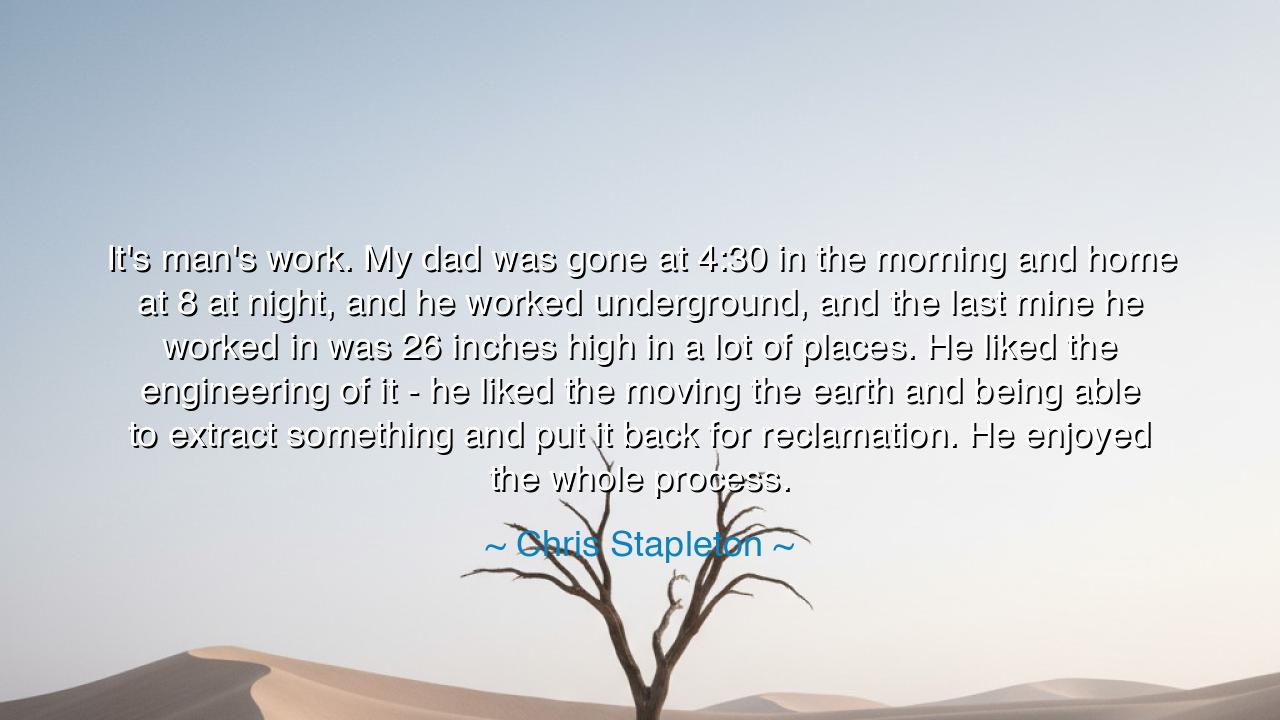
It's man's work. My dad was gone at 4:30 in the morning and home
It's man's work. My dad was gone at 4:30 in the morning and home at 8 at night, and he worked underground, and the last mine he worked in was 26 inches high in a lot of places. He liked the engineering of it - he liked the moving the earth and being able to extract something and put it back for reclamation. He enjoyed the whole process.






In these humble yet powerful words, Chris Stapleton honors a truth as old as the earth itself — the dignity of labor, the sanctity of work, and the quiet greatness of those who toil unseen. “It’s man’s work. My dad was gone at 4:30 in the morning and home at 8 at night, and he worked underground… He liked the engineering of it — he liked the moving the earth and being able to extract something and put it back for reclamation. He enjoyed the whole process.” This reflection is not merely a son’s tribute; it is an invocation of an ancient principle: that true nobility is not found in comfort or fame, but in the strength of one’s hands, the steadiness of one’s heart, and the purpose of one’s labor.
The meaning of this quote lies in the reverence for honest work — the kind that demands endurance, skill, and humility. Stapleton’s father was a coal miner, a man who ventured into the dark each day so others might live in the light. His days were long, his task dangerous, his body worn, yet his spirit was unbroken. In speaking of him, Stapleton reminds us that the measure of a person’s greatness is not in wealth or recognition, but in the devotion to their craft. His father’s pride did not come from the gold he earned, but from the earth he moved, from his role in the vast cycle of creation — extracting, building, restoring. Such is the quiet heroism of those who work not for applause, but for the love of doing something well.
The origin of this wisdom reaches deep into the heart of human civilization. From the first farmers who bent over the soil, to the blacksmiths who shaped iron in the fire, to the miners who descended into the belly of the earth, the story of mankind has always been written in sweat, grit, and endurance. The ancients taught that work was both a duty and a sacred act — the joining of human effort with divine order. To labor was to participate in creation itself. Stapleton’s father embodied that timeless virtue: to find beauty in toil, meaning in hardship, and satisfaction in process rather than reward. His love for the engineering and reclamation of the land reveals a spirit not of exploitation, but of stewardship — the awareness that one’s labor should both take and give back, completing the eternal balance between man and nature.
Consider the story of John Henry, the legendary steel-driving man of American folklore. Like Stapleton’s father, he faced the crushing weight of the earth — and of life itself — with unyielding resolve. John Henry’s story, though mythic, mirrors the truth of countless real lives: men and women who rise before dawn, give their strength to the world, and return home under the cover of night. Their names are rarely sung, yet they are the heartbeat of every age. In their labor lives a nobility that kings and conquerors can never claim — for they do not rule the world, they build it.
Stapleton’s words also speak to the inheritance of values — the unseen wealth a parent passes to their child. His father’s devotion to his work was not only a means of survival, but a form of teaching. Through his example, he showed his son the meaning of discipline, perseverance, and craftsmanship. This inheritance, though not material, is far greater than gold. It is what shaped Stapleton into the artist he became: one who understands that creation — whether through song or through soil — demands patience, humility, and love. In honoring his father’s labor, he honors the foundation upon which all art and civilization rest.
The lesson here is one of reverence — for work, for nature, and for those whose strength sustains the world. In an age that glorifies ease and speed, Stapleton’s reflection calls us back to what is eternal: the dignity of effort, the pride in doing something well, the joy of creation. Whether one works with hands or with mind, the principle is the same — greatness is born not of privilege, but of perseverance. Every field plowed, every note sung, every problem solved is part of the same sacred act — the transformation of raw material, whether earth or idea, into something of value.
Therefore, my child, remember the wisdom in these words: find joy in the process, and honor those who labor before you. Work not for reward, but for the satisfaction of doing what must be done with care and integrity. Respect the builders, the diggers, the thinkers, the teachers — for all creation depends on their unseen strength. And when your own work feels heavy, recall the image of the miner beneath the earth, steady and patient, carving light from darkness. For it is through such hands, such hearts, and such perseverance that the world endures — and that, indeed, is man’s work in its truest and most sacred form.






AAdministratorAdministrator
Welcome, honored guests. Please leave a comment, we will respond soon